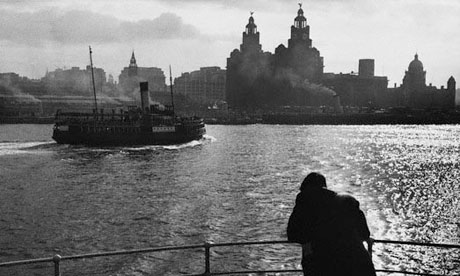
I must begin by saying that I love Joan Bakewell. I think the act of criticising her should be made illegal, perhaps outlawed as a cruel sport like fox-hunting.
For women of all generations, Bakewell is something of an inspiration: at 78, she is still a prolific journalist, a vigorous campaigner for the rights of older people and a life peer. The dust jacket of her latest book cheerfully divulges that she has "two children and six grandchildren".
Her first novel, All the Nice Girls – well received when it was published two years ago – tackled the changing social roles of women against the backdrop of the second world war. In She's Leaving Home, Bakewell returns to similar thematic territory.
It is the late 1950s in Staveley, a small town on the outskirts of Liverpool still recovering from the war, where Eddie is a film projectionist at a struggling cinema (there are dark murmurings about a newfangled entertainment device called "television" and the perpetual threat of the Grande being turned into a bingo hall). At home, Eddie's cheerless wife, Beattie, feels trapped in her domestic role and hankers after the long-gone wartime sense of purpose and romance.
But it is the couple's 16-year-old daughter, Martha, who provides the catalyst for real change. Eager for escape from her dreary typing course, Martha rapidly gets seduced by the taste of Gaggia espresso ("She winced at the black liquid but knew it was something she would learn to enjoy") and the bright lights of the big city and runs away to Liverpool, where she moves into an ad hoc commune of artistic types who wear bohemian clothes and make sculptures of men with erect penises. They also spend a lot of time worrying about the nuclear threat, and soon Martha finds herself intrigued by Cuba, "where they'd had an interesting revolution", and going on protest marches at Aldermaston.
Meanwhile, she loses her virginity to Duncan, an older man who quotes Dante as a chat-up line. When Duncan casually sleeps with all the other women in the house, Martha struggles to suppress her innate bourgeois disapproval and embrace the changing times. Back at home, her parents are left to muddle on without her and find their own way in this brave new world of rock'n'roll and female empowerment.
It's an engrossing premise and Bakewell makes sure that the narrative rattles along. She is an astute observer, especially when she focuses on the older generation. Her portrayal of Beattie, the resentful housewife who wears her defensiveness as a protective cloak against past disappointments, is sensitively done: "She knew suddenly that the world did not share the picture she had of herself… It made her wary, and watchful, cautious about putting her vulnerabilities on show." Bakewell is also good on the position of women before the freewheeling 60s took hold: the casual sexism that results in cinema usherettes being given "little pats and squeezes by the men to acknowledge their girlishness". And her descriptions can be economic and effective – the sky is "a heavy spread of dirty cotton wool".
But occasionally the historical detail feels heavy-handed. References to news events are forever being dropped unnaturally into conversations, so that schoolboys chat about Kerouac and cinema newsreels report that "Rudolf Nureyev, the star of Russia's Kirov ballet, was claiming political asylum at Le Bourget airport". Such statements, instead of providing subtle contextualisation, feel intrusively bald.
It is the mark, perhaps, of an author who does not have enough confidence in her own storytelling. The best part of She's Leaving Home – the shrewd depiction of an unhappily married couple in postwar England – is also the most understated, and this is what seems to come to Bakewell most naturally as a writer. To be honest, I could have done without all the espressos and cinema newsreels. What Joan Bakewell's next novel needs is more Joan Bakewell.

